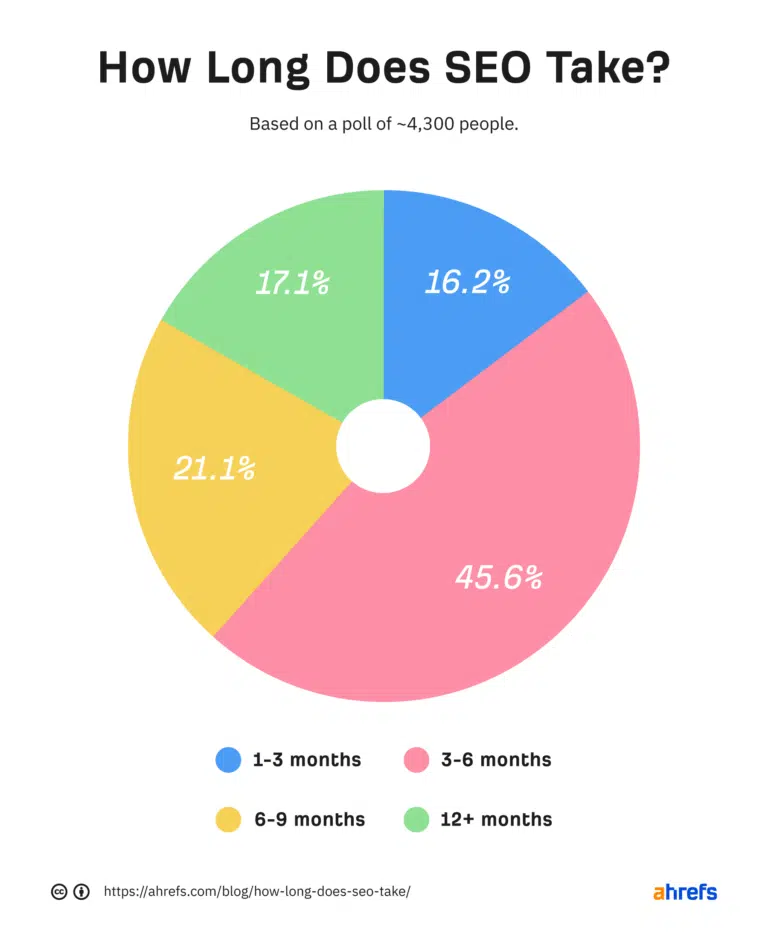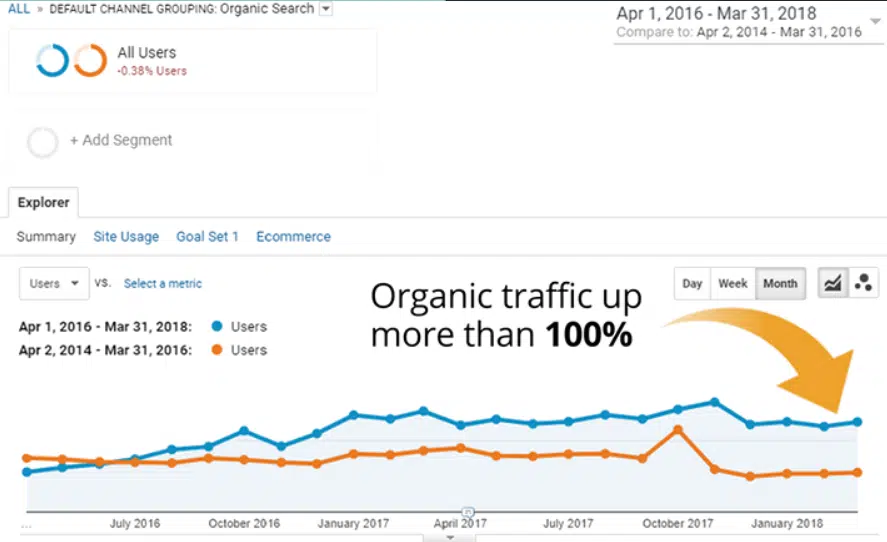How long SEO takes to work
Learn the average timeframe to see results from SEO and key factors that influence your SEO program's performance.
Online dating, two-day delivery, binge-watching a series on TV.
SEO is like the slow-food movement in a fast-food world.
How long do you have to wait, though?
This article will discuss:
- What are SEO “results.”
- The average timeframe to see results.
- The factors that can impact how fast you can get results from SEO.
What are SEO ‘results’?
First, let’s talk about what “results” mean before discussing how long it takes to get them.
At the outset of your SEO program, you will want to set goals that outline what you want your SEO program to accomplish. Revenue may be one of them.
SEO can drive many things, including revenue.
However, for the purpose of this article, there is only one important metric to measure SEO success:
Organic traffic.
So when I refer to the timeframe to see SEO results, I am referring to a significant uptick in organic traffic because that is how I have always measured SEO success.
Yes, you want to see organic traffic driving revenue.
And the good news is that when SEO drives targeted traffic, that traffic can be one of the biggest revenue drivers for a website.
But so many factors (many of which are outside of the scope of SEO) can contribute to whether you get a conversion on a website. For example, your price point, landing pages and sales process.
That is why I believe traffic is the best indicator that your SEO program is working.
How long does it take to see SEO results?
It typically takes several months up to a year to see measurable SEO results. Your mileage may vary.
This is a general consensus and what I typically see with clients.
Google suggested a similar timeframe in this video:
And research from Ahrefs supports this, too:

Here are some real-world examples:
Ecommerce site
An ecommerce furniture business lost significant search rankings and traffic after launching a redesigned website.
We worked with them and identified the primary cause of the problem was a bloated index.
After implementing our recommendations, here is a timeline of the results:
- After two months, we ranked 56 priority key phrases back onto Page 1.
- Within three months, the client saw a return to previous traffic levels.

B2B site
A manufacturer’s website suffered from lost rankings and dwindling organic search traffic; they didn’t know why.
After an in-depth analysis, we recommended improving user experience, internal linking and content quality.
After implementing our recommendations, here is a timeline of the results:
- After four months, the client started to see traffic results.
- Within nine months, they received record levels of organic traffic.
- Within two years, they saw a 100% increase in organic traffic.

B2C site
A nationwide drug-screening company reached out to us to improve their underperforming website.
Our recommendations included on-page optimization, technical SEO, user experience and content improvements
After implementing our recommendations:
- Within six months, traffic increased 166% compared to the same six-month period two years prior.

What factors impact time to SEO results?
Where any one website falls into the timeframe largely depends on several factors.
Three of the most important are:
- Your actions.
- The website.
- The competition.
1. Your actions
The “SEO results” clock starts ticking once you implement the program, not when you hire someone, and not during the time that strategies are being formulated.
Many businesses have failed at SEO even after hiring SEO experts because of their inability to implement the recommendations. This is a significant cause of failures.
This can happen for many reasons, including SEO “buy-in” or if IT needs to make a technical change to the website.
Regardless of the reason, for every month that is wasted not implementing SEO strategies, it’s a month that you can expect not to see results.
2. The website
If you’ve got a really challenging website, digging yourself out of a hole will usually take longer before you are in good enough shape to compete in the search results.
Maybe you:
- Have a lot of technical issues that need to be resolved.
- Received a manual action from Google due to SEO efforts of years past.
- Were negatively impacted by a Google core update.
Or you might have a new domain, which typically can take a little longer to see results than a more established site.
These are all reasons why it might take longer to see results, but what about quick fixes? These are more rare but they can happen.
For example, it’s not unheard of for there to be a robots.txt file that’s accidentally blocking the search engines from accessing the site. Yes, this still happens.
Something like this can be resolved fairly quickly and produce fast SEO results.
3. The competition
I’ve always said that SEO should aim to beat the competition, not the algorithm. And depending on what space you’re playing in, the competition can be tough.
Sometimes your competition will have more resources than you, so they can work faster. (All is not lost in these situations, as long as you can stay nimble and creative.)
Or maybe you are in a your-money-or-your-life industry where you will be held to a higher standard by Google and it might take more effort to compete.
Or maybe you’re after top rankings for million-dollar keywords.
It took my company two years to get a client to Position 1 for a short-tail keyword. And to say it was worth the time and effort for the client is an understatement.
How to get better SEO results, faster
While you’ll probably never get faster results than the timeframe outlined in this article, there are ways to speed up the process.
- Get an in-depth, technical SEO audit on your website. This can pinpoint exactly how to fix your site and how to beat the competition with prioritized recommendations on what actions will make the biggest impact.
- Enlist the help of an expert SEO consultant or agency to help you implement an SEO program. Expert guidance is worth its weight in gold, and having that wisdom on your side as you enter the search battlefield will make all the difference.
Initial SEO results are good, but ongoing results are better
The SEO results you see within several months to a year are not necessarily the best results you will ever get.
And because SEO is never done, you can expect better results as time goes on, so long as your SEO strategy is solid.
Opinions expressed in this article are those of the guest author and not necessarily Search Engine Land. Staff authors are listed here.
Related stories
New on Search Engine Land